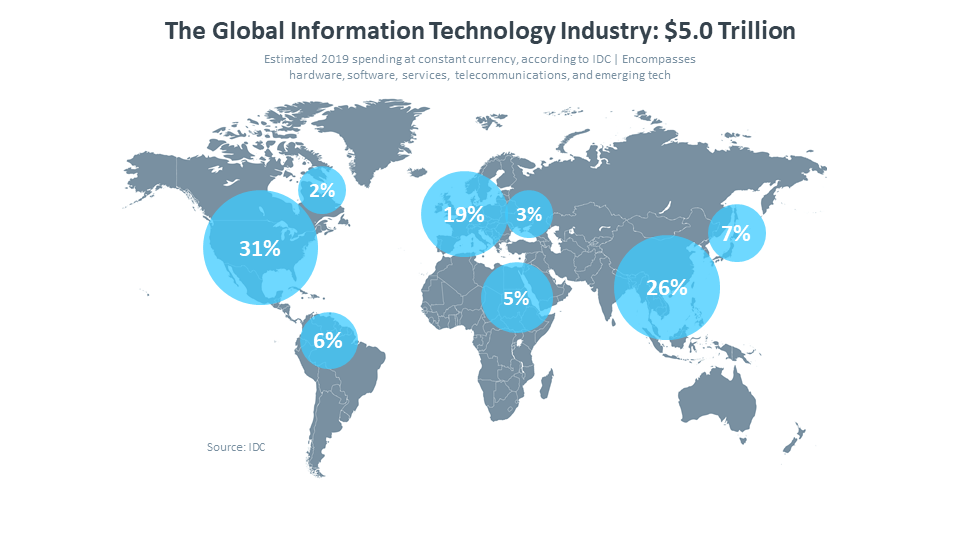5 Tech Startups Making Waves in 2019

This year, the global information technology industry is estimated to be worth $ 5 trillion. With that much money on the table, it’s only common sense that the competitive field will be hopelessly crowded. But who floats and who flops? Huge names like Amazon and Google dominate the news, but smaller companies are coming in to disrupt key niches in tech, and those are the ones to watch. From innovation in emerging fields to cornering growing markets to providing unbeatable value, here are my five startups to watch in 2019.
Faire
Started in 2016, and headed by CEO Max Rhodes, Faire has raised a whopping $ 116 million in equity and brought in an estimated $ 100 million in 2018. The concept of the company is simple; in the age of the retail giant, connect artisans and independent producers with the retailers will sell them. Especially with consumers emphasizing small vendors and eco-conscious purchases, Faire has arrived at the right time. However, conventional ‘Mom and Pop’ stores can no longer compete on the national and global levels, and Faire provides an elegant solution. Artisans simply apply online, and the Faire team reviews the application, on-boarding suppliers that pass approval. The platform produces revenue through commissions. Artisans pay a 28% commission on each sale. Brands pay a 25% commission on the first sale, which drops to 15% for subsequent sales. As a risk-reduction policy for wholesalers, Faire accepts free returns within 60 days for items that don’t sell. Using this model, the company has grown to supply 5,000 brands to 35,000 stores. This strong foothold in the artisan supply line makes Faire a definitive company to watch in 2019.
Patreon
Patreon was founded by musicians Jack Conte and Sam Yam in 2013, but didn’t rise to prominence until 2016. Since its founding, the company has raised $ 166 million in equity, and had an estimated revenue of $ 35 million dollars in 2018. As its name implies, the company brings the old-fashioned concept of arts patronage to the modern age. Internet-based content and creators are a rapidly growing industry, outpacing film and television growth by a factor of 2. During this shift to a new kind of media distribution, Patreon has risen as a method of crowd-sourcing income for social media personalities and creators. Patrons can pledge monthly amounts to creators they enjoy, and creators can create tiers where they can reward high pledgers with special perks, including patron-only paid content. However, the amount a given creator is paid depends entirely on their fanbase, with some top creators making tens of thousands of dollars per month, and most making under $ 100 per month. The platform’s revenue comes from taking a cut of monthly pledges, which ranges from 5% to 8% depending on the service package. Although it started ahead of its time, the cultural moment came around and Patreon is turning into a juggernaut in the social media content sphere.
ODEM
ODEM was founded in 2017 by Richard Maaghul with the goal of revolutionizing education through the Ethereum blockchain platform. The company has raised $ 2.8 million in equity so far and has already brought in an estimated $ 1 million in revenue in 2018. Marketed as an ‘On-Demand Education Marketplace’, ODEM functions as a decentralized learning space where students, educators, and service providers can come together to develop custom educational experiences. Using artificial intelligence, and Ethereum’s smart contracts, the platform seamlessly organizes groups from around the globe, eliminating the high costs, opacity, institutional barriers, and lack of individual attention of traditional education schemes. The platform not only allows intermediary-free connection between students and teachers, but also allows employers to engage directly with employees, and direct them to the courses that will make them strong candidates. Additionally, accredited entities can use the smart contract system to deliver certificates worldwide through the ODEM platform. Revenue is derived from a Program Revenue Sharing (PRS) framework, which automatically distributes funds to ODEM platform partners as described in the company’s technical whitepaper. As an early adopter of disruptive blockchain technology in the education sector, ODEM is set to become a major player in the coming years.
Proxy
Founded in 2016 by Denis Mars and Simon Ratner, Proxy quickly raised $ 14 million in equity, bringing in $ 1 million in revenue in 2018. The company situates itself in the Internet of Things (IoT) niche with a method for verifying ID from one’s smartphone, allowing easy access to private areas. As more and more of our lives are controlled through our devices, it only makes sense to replace keys and cards with an app. Currently, the four main applications targeted by Proxy are commercial property, small businesses, multi-family residential housing, and enterprise level facilities, which each have their own unique needs for ID tracking and entry verification. To tackle these problems, proxy developed a smartphone app, a management platform, and the corresponding signal-reading hardware. In the future, the company plans to use this technology to expand into ID verification for ride-share and event check-in applications. Revenue comes from the service packages Proxy provides, with quotes being extremely variable based on the number of doors, the presence of a preexisting electronic fob system, and the type of application. A solid business plan and an eye to expand means Proxy is set to dominate its corner of the IoT ecosystem in 2019 and beyond.
Dave
Dave was founded by Jason Wilk in 2016, raising $ 13 million in equity and returning an impressive $ 19 million in revenue in 2018. He started the company with Paras Chitrakar and John Wolanin after dealing with punishing overdraft fees from banks during college. His solution: an integrated solution for tracking expenses and preventing fees. The name Dave is taken from the biblical David and Goliath, an apt comparison for a small startup taking on major banks. But also like the biblical David, Dave’s plan is rock solid. Once a user proves a steady income and money in the bank, they can pay in just $ 1 a month for the right to request an interest-free loan up to $ 100 if needed, and by shopping at certain stores the monthly fee can even be waived. The app tracks expenses and lets the user know if they are in danger of going into overdraft. The service also has numerous other features including finding ATMs, freezing lost credit/debit cards, sending checks for free, as well as leveraging rent payments to build credit. There’s even a connected service that helps users find a side job. This unbelievable value proposition has netted Dave 3 million users and makes it a stand-out not just among banking apps but any startup looking out from 2019.
Business & Finance Articles on Business 2 Community
(22)


